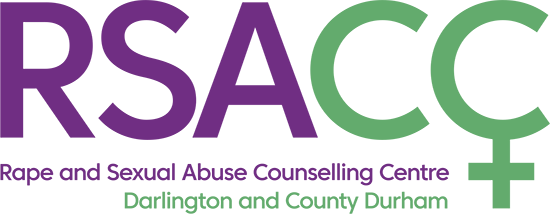This website uses cookies so that we can provide you with the best user experience possible. Cookie information is stored in your browser and performs functions such as recognising you when you return to our website and helping our team to understand which sections of the website you find most interesting and useful.
If a sexual violence survivor shared their experiences with you would you know what to say – and not to say?
- New Rape Myths Impact Report shows how rape myths still contribute to a survivors trauma
- Over 50% were worried they wouldn’t be believed by the person they first told about their experience of sexual violence and over 25% told us they worried people would think it was their fault.

The Rape and Sexual Abuse Counselling Centre – Darlington and County Durham (RSACC) – the only specialist sexual violence charity in the area – has launched a new Rape Myths Impact report – after speaking to its staff, volunteers and local survivors of sexual violence. The report, which is based upon life experiences from local survivors and RSACC’s own staff and volunteers, paints a very poor picture of how many are often responded to with rape myths that place responsibility and guilt upon them.
Isabel Owens, RSACC CEO commented:
“Today is the start of the UN’s 16 Days of Activism against Gender Based Violence and it is shocking to read in this report how despite the many campaigns and initiatives, sexual violence survivors are still being retraumatised by the responses they receive. It’s often professionals, friends and family members who don’t know how best to respond and may often repeat rape myths, rather than believing the survivor.”
Rape myths are widely held attitudes and false beliefs that deny and justify rape and sexual abuse. They include: placing the blame on the survivor for what they were wearing, how much alcohol or drugs they may have had, where they were and how late they were out. Clearly placing the blame and responsibility on them. This can also lead to survivors failing to come forward for support and low reporting rates to the police.
Comments by survivors from Darlington and County Durham included:
“My dad’s responses were never helpful. His first reaction was “that’s why I always told you to watch out for vulnerable situations”. It felt like he was blaming me for what happened. And did not understand that you don’t always know you’re vulnerable or know that a situation is bad until you’re already in it. I thought my perpetrators were safe people at the time.”
———————-
“My friends at the time gossiped about it and I don’t think they realised I was a victim as we were so young. I think some of them thought I was lying and others just thought I was being promiscuous or wanted it.”
———————–
“My uncle did not believe me and essentially told me I “was lying”. A 10 year old child accused of lying! Needless to say he has not been a fixture in my life since.”
———————–
“A friend didn’t believe it could have happened to me as he was such a ‘lovely boy’”
Isabel continues:
“Because rape myths are so widespread in our society, they are not often questioned. But we all have a duty to challenge them. And while it is often very hard for a survivor to tell someone, we know it can be difficult for the recipient, especially if they know the perpetrator and don’t want to believe that they could have committed such an horrendous crime.”
However, although the positive responses were much fewer, it was clear that getting it right was very important in a survivor’s recovery.
“I can remember exactly what my Mum’s response was. She was calm and listened and gave me a hug. She never blamed or questioned me and supported me to provide a statement to the police. Looking back now as an adult who has experienced child sexual abuse her response was validating, non-judgmental and came from a place of belief and support.”
———————–
“No response, just listening, no judgement, no sympathy. Just letting me explain and asking what I wanted to do about it.”
———————–
“They were really supportive and let me tell them at my own pace. They made it clear that it wasn’t my fault and that they would support me in whatever I chose to do next.”
———————–
Isabel concluded:
“As a specialist sexual violence charity supporting survivors for over 30 years, we have used our extensive experience to produce guidance on how best to respond to a survivor when they disclose. And disclosure can happen to anyone, at any time. Not just to friends and family but to professionals such as the doctors, nurses and teachers as well as in the workplace within human resources or to line managers. That’s why we also offer training courses to support organisations in the care and well-being of their staff who are survivors, or maybe supporting survivors.
We also provide information on Rape Myths, so our local community can understand them for what they are, and the awful and long lasting impact they can have on survivors.”
To read a copy of the Rape Impacts Report go to: Rape Myths Impact Report – RSACC (rsacc-thecentre.org.uk)
To understand how best to support a survivor go to: How can I support a sexual violence survivor? – RSACC (rsacc-thecentre.org.uk)
To know more about Rape Myths: Myths – RSACC (rsacc-thecentre.org.uk)
For more information on RSACC’s Training for Professionals go to: RSACC Training – RSACC (rsacc-thecentre.org.uk)
Notes to Editors
RSACC was established in 1990 and is unique in Darlington and County Durham in providing free and confidential face to face counselling, telephone, ISVA, email and group support to survivors of rape, sexual abuse and domestic abuse. RSACC is a member of Rape Crisis England and Wales and part of its national network of 39 Rape Crisis Centres.

